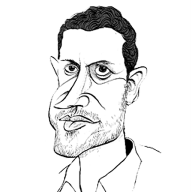Reading the Observer on Sunday (don’t judge me, it’s my job) I came across the story of a Special Branch policeman called Officer A, who lived undercover with extremist left-wing groups for years in the mid-1990s. As a member of the Special Demonstration Squad, and distant from his wife and child, he grew a ponytail, befriended and slept with Trotskyists, lived a double life, and kept having to punch his fellow policemen to preserve it.
‘Blimey,’ I thought to myself. ‘That’s got to be one of the least pleasant jobs in policing.’ But then, in the Mail on Sunday (like I said, it’s my job), I read about the policemen who, 24-7, perform bodyguard duties to Princesses Beatrice and Eugenie. ‘Then again,’ I thought. ‘Maybe not.’
Both of these stories make me think of London traffic and bollards. You know the stuff they’ve done at Oxford Circus and in Kensington High Street, where they figured out that getting rid of supposed safety features — islands, signs, railings and suchlike — actually makes people drive better and keeps pedestrians safer? Warms my libertarian heart, that. It might not sound like it’s got much to do with Special Branch, I’ll concede, but bear with me, because I really think it does.
Let’s start with the SDS chap. He infiltrated his first group by punching out a suspected racist in a student canteen, and then joining in on — or arguably, initiating — a mid-demonstration attack on some uniformed policemen. Thereafter his main role was to report on clashes that his and other left-wing groups, which had often also been infiltrated by the SDS, had with right-wing groups, which had been too.
The Observer added that most SDS agents had organisational skills that your average foaming ideologue usually lacks. Often they ended up in charge. Essentially, then, the police were secretly organising groups that attacked other groups they were also secretly organising. Did you ever read Tom Sharpe’s Riotous Assembly? A couple of dozen undercover policemen are released into a small South African town to infiltrate terrorist groups. Instead, they meet each other, recruit each other, and egg each other on into conducting a bombing campaign. And at the end, there’s nobody left to arrest.
You wonder if they might have had less trouble with extremist political groups in the mid-1990s if they just hadn’t bothered. And so to bodyguards. Odd discipline, body-guarding. You always see them first. That bald bloke’s massive, you think. I wonder what he’s doing in this restaurant? Then you peer around him, and somewhere in his shadow you spot Geri Halliwell, whom otherwise you wouldn’t have noticed at all.
The other day, not dissimilarly, I was wandering around Primrose Hill. Down one anonymous terraced street, around the corner of another, and bang, face-to-face with a couple of large, machine-gun-toting policemen who were standing outside a house I wouldn’t have otherwise looked at twice. ‘Aha!’ I thought to myself. ‘That must be where David Miliband lives.’ It reminded me of wandering around Heathrow once with another foreign secretary (naming no names) and being utterly freaked out by the sheer number of fresh-faced men in bulging shorts and polo-shirts who were trying to pretend they weren’t following us. For the first 20 seconds, I thought we were about to get killed.
With a Cabinet minister, though, you can see the point. But a minor princess? Is there really much of a terrorist threat? As a justification for the round-the-clock protection, the royal household likes to cite the fact that somebody tried to mug Eugenie while she was backpacking in Cambodia. Is that the best they can do? One might suggest that a cheaper way to stop her from being mugged in Cambodia would be to discourage her from going there in the first place. And however dangerous Cambodia is, this doesn’t really justify why she also needs protection when she’s back in the UK, studying art history in Newcastle.
I always feel a bit sorry for the Yorks. They sit atop a royal faultline. On the one hand you have the Waleses, Wills and Harry, who plainly loathe having to be followed around by Special Branch all day, but put up with it so as not to end up with their heads on spikes. And on the other you have the Phillipses, Zara and the other one, who don’t bother with that sort of thing at all, and seem to live far happier lives as a result.
The Yorks want to be like the former, but do so by cleaving to all the trappings they hate. It’s a strategic error. And that, I suppose, is why I thought of traffic and bollards. Because if it wasn’t for all those times we’ve seen them in the Mail on Sunday, next to those stories about how much their protection costs, then they wouldn’t need that protection, because nobody would know who they were.
Can somebody do something about Nick Clegg? I don’t mean his policies. I’m not interested in them. Nobody is. I mean his clothes. They don’t fit, and I don’t understand why, and it won’t do.
He’s a reasonably tall guy, but his clothes are enormous. In his suits, he is oddly dwarfed. The shoulders soar over his shoulders as though he were a Klingon. The fronts of his jackets flap together in a manner that suggests they are about to be double-breasted, even though they never are. And don’t even get me started on his ties. The man wears ties that are wider than his face. Get hold of a photo of him, any photo, and study it. He’s all suit and all tie. Hardly even any shirt.
I’ve written about this before, but watching him last week I realised I’m just going to have to bang on and on about it until something changes. This sort of weirdness is actually distressingly common in the Conservative party, too. I’ve also written before about the unbearably patrician way that George Osborne ties his ties (knot-thin-fat), and the actually quite creepy matching tie and breast-pocket-hanky sets favoured by Dominic Grieve which are precisely why (you mark my words) nobody will ever take him seriously as a proper member of the top team.
I don’t expect any of these people to remotely understand this themselves, because if they did, they wouldn’t look like that in the first place. But those who surround them and advise them must know that I am right, and should act accordingly. That Gordon Brown could do with a wash and all.
Hugo Rifkind is a writer for the Times.







Comments